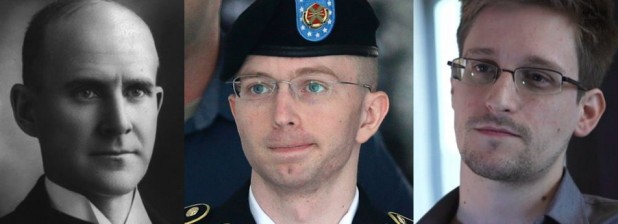KEEPING SCORE » U.S.
Merry Christmas! President Obama: Harding Pardoned Debs So Why Not Pardon Manning and Snowden Too?
December 3, 2013 · 0 Comments

Above: Debs, Manning, Snowden.
By Murray Polner:
The New York Times recently ran a series of letters about President Obama’s reluctance to use his power of pardon. Compared to some presidents like Harry Truman who pardoned a prisoner a mere eight days after succeeding FDR, wrote Professor Sanford Levinson of the University of Texas Law School, Obama, perhaps recalling Bill Clinton’s outrageous pardon of Marc Rich, has pardoned just 39 people, 25 of whom had only received probation. Levinson even mentioned the conservative Republican Governor of Mississippi Haley Barbour who last year pardoned 215 prisoners including some who had killed. Why? Barbour explained, “Christianity teaches us forgiveness and second chances.” Excellent advice for Christians and everyone else, including Barack Obama, now entering his sixth year as president. For guidance, he might look back at a predecessor named Warren G. Harding.
Almost ninety-two years ago, Harding, an unlikely and undistinguished American president who had just succeeded Woodrow Wilson, a highly unpopular president, commuted the prison sentence of Eugene V. Debs, an antiwar, anti-draft socialist who had spent three years of his ten year sentence for opposing America’s entry into World War I in Atlanta Penitentiary.
In June 1918, Debs delivered the speech that landed him in prison and became the Government’s biggest catch. The three-time Socialist Party candidate for the presidency—he would run again in 1920 while still a prisoner, his campaign button featuring his portrait along with the words, “For President: Convict No. 9653”—openly defied U.S. foreign policy and the draft, telling his audience:
“The master class has all to gain and nothing to lose, while the subject class has had nothing to gain and all to lose—especially their lives. They have always taught and trained you to believe it to be your patriotic duty to go to war and to have yourselves slaughtered at their command.….They alone declare war and they alone make peace….”
For this “crime” he was indicted by a federal grand jury and arrested in Cleveland for violating the Espionage Act. The following November he received that ten year sentence.
Pardoning so prominent a dissident as notorious in his era as Edward Snowden and Chelsea Manning are to ours, was hardly easy. Yet it was also a highly political move, wisely reflecting Harding’s campaign promise of a presidency dedicated to “normalcy.” But at the same time it was also a remarkably humane act.
After issuing his order to release the prisoner, Harding had the courage to invite Debs to visit him in the White House, where the two men, so different in so many ways, shook hands, and spent an hour talking, much to the mortification of many in Congress, the bellicose American Legion, his wife Florence, as well as Republicans who had voted for him and considered Debs a traitor.
But Harding—always falsely rumored to be part-black, was very different from the bigoted Wilson, who once told his secretary Joe Tumulty that Debs “was a traitor to his country and he will never be pardoned during my administration.” Forever tainted by his corrupt appointees, Harding has since been portrayed by most historians as one of our worst presidents. Still, unlike most presidents since Lincoln, he tried to broach the question of racial inequality and supported anti-lynching legislation and once dared tell a gathering of whites in Birmingham, Alabama, “We cannot go on, as we have for more than a half century, with one section of our population…set off from real contribution to solving our national issues, because of a division on race lines,” an extraordinary presidential statement in the 1920s. He also supported the Washington Naval Conference, a genuine if ultimately futile effort to limit the navies of Britain, Japan and the U.S. and ward off future wars.
By contrast, it was Wilson who introduced the Espionage Act in 1917, aimed ostensibly against real spies and which remains a widely used if highly questionable tool of today’s Justice Department. It was followed by congressional approval in 1918 of the Sedition Act, the first time since John Adams’ infamous act of the same name which, for the first time, criminalized dissent but which his successor Thomas Jefferson wisely and promptly repealed.
Snowden and Manning have something of Eugene Debs’ understanding that dissent never equals disloyalty. By drawing on the courage of—yes—Warren Harding, and offering clemency would certainly not be politically easy but it would in time burnish Barack Obama’s legacy.
Murray Polner, who writes our Keeping Score column, wrote “No Victory Parades: The Return of the Vietnam Veteran, co-wrote “Disarmed and Dangerous: The Radical Lives & Times of Daniel & Philip Berrigan” and once taught in Rikers Island jail.
By admin










Sorry, comments are closed on this post.